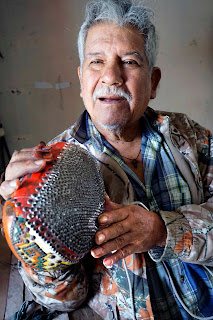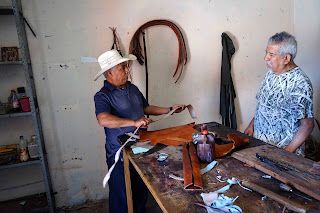Luis Sarita is a leather worker (talabartero). He makes a range of products, from saddles, harnesses and holsters to billfolds, belts and huaraches. I met Luis in 2019. I was searching for a talabartero and a tanner (curtidor), and was told I could still find some in Ejutla, a pueblo an hour and a half from Oaxaca. It took a bit of searching, but I was finally directed to Luis's workshop. I explained my project to him and he accepted to be part of it without hesitation.
After a friendly invitation to a copita de mezcal, I arranged to come back a few days later to photograph him. As I was getting ready to leave, he told me he was an avid player of Pelota Mixteca, an ancient ball game played by indigenous people in the region, and proudly showed his glove. At 72, he was the oldest player on his team. It was an important part of his life.
When I came back later that week, I found Luis working at his table. It was covered with the tools of his trade. Along with the punches and cutting blades were an assortment of hides and skins; cow and goat hides as well as snake, iguana and crocodile skins. Ejutla used to be a leather working center with many talabateros. Now there are four and there is only one tanner left. Cow and goat hides must now be purchased in Ocotlán, a nearby pueblo. The exotic skins are expensive and very hard to find and some are now protected by law and cannot be hunted. Luis understands the ecological concerns, but claims that as a talabartero, this is his livelihood. "If I cannot get the raw materials I need, how can I survive?"
Most of Luis' clients are local ranchers and farmers. Many come to Luis because he does all his work by hand, no machines are used. He even cuts his own thread from goat hide and punches all the holes by hand. He has been working leather for fifty years and what he likes most about his profession is that he still follows the old tradition and produces high quality, hand made goods that will last many years. This is what sets him apart from other talabarteros. His way of working is dying out. Machine made and imported synthetic goods are adversely affecting his business, as are environmental laws protecting animals from being hunted. He feels that the profession he has practiced for fifty years is doomed to extinction. He is one of the last of his kind.
When I returned to Oaxaca in January 2022, his friend, Alberto, who makes guantes de Pelota Mixteca, gave me the sad news that Luis had passed away a few months earlier. His fellow players carried his casket to the Pelota Mixteca playing field and gave him the send off that he so rightfully deserved.
 |
| Luis and his guante de Pelota Mixteca |
For more information about Pelota Mixteca, see:




1 comment:
Amazing information
Post a Comment